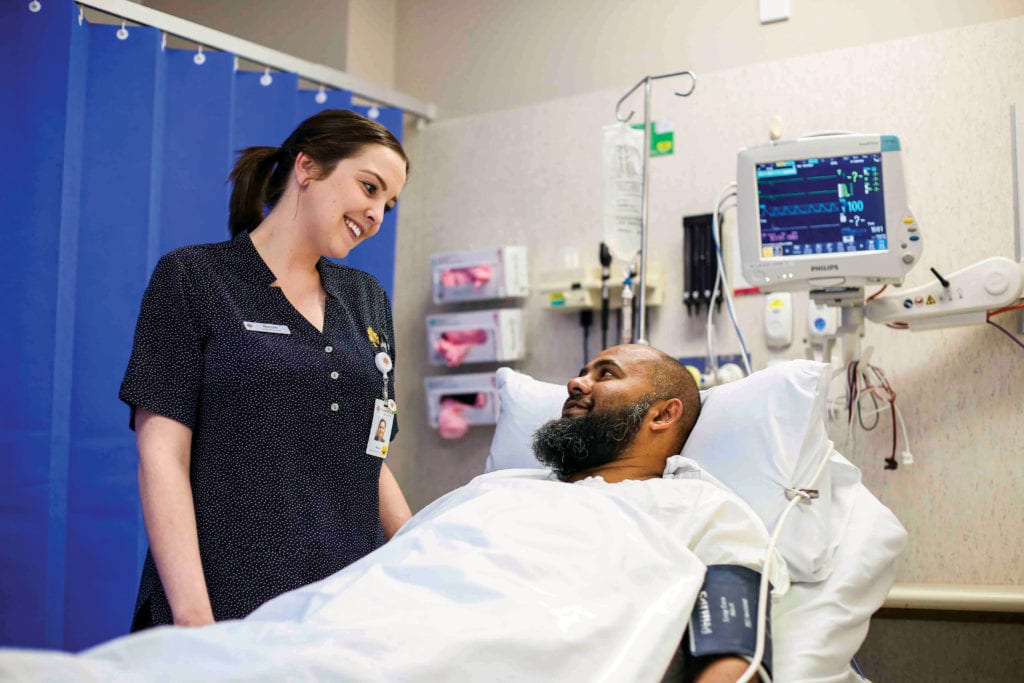
By Theresia Titus
In the world of medicine, physical trauma is defined as wounds produced from deliberate physical injuries as a result of traumatic events such as accidents and acts of violence.
Dr Jason Fitch, Director of Emergency Medicine at St John of God Murdoch Hospital – who has been working in the field of emergency medicine for 20 years – believes love, compassion and humanity are crucial to the healing process of physical trauma.
“Compassion is a part of our core values at St John of God Health Care and this means having deep care for our patients, their situation and their family,” he said.
“Importantly we have to remember what a visit to an emergency department for that patient or their family means to them in the context of their lives.
“For many, the experience of an emergency department is unfamiliar, confronting and distressing, and respond accordingly with love, compassion and humanity,” he continued.
Trauma care that patients receive is unusual in that emergency personnel have to “operate in big teams and a lot of action happens simultaneously, often with multiple specialists at once”.
“We have to have a clear structure, process and order to what we do so that we can care for patients efficiently and effectively,” Dr Fitch explained.
“When a patient comes in with major injuries they might be in spinal precautions, strapped down and unable move. This is confronting and confusing.
“So it is important that we remember to keep patients at the centre of our care, to make sure their needs are assessed and try to reassure the patient by talking them through the process,” he added.
Dr Fitch stated major injuries treated in Perth are often a result of motor vehicle accidents, sporting injuries or falls, producing blunt force injuries that can be life-altering.
“Some injuries we see are life-threatening, but much more likely to be life-changing and the recovery involved can last months to years after our initial care, physically and emotionally,” Dr Fitch said.
“Most people who experience traumatic injuries are initially in shock: one second you are fine and all of a sudden you have significant injuries. As a result, many patients are in a state of disbelief when they come to the hospital.”
Patients’ reactions towards traumatic events can widely vary often as “a result of fear or frustration”, which sometimes can be expressed in a form of anger or aggression.
“We try to communicate with them as much as possible so that we can reduce their fear or reassure them they have the necessary information to understand what is going on and address the issue,” Dr Fitch said.
“Once we resuscitate a patient the focus very quickly is on keeping them informed about what is happening to them so they can process it and understand their care.
“If someone is showing signs that they are not coping or need additional support, we will ensure that patient has access to specialist care to suit their needs,” he continued.
“ … many patients are in a state of disbelief when they come to the hospital.”
Dr Fitch said “it’s very common” for patients of physical trauma to develop post-traumatic stress disorder (PTSD) – a type of anxiety disorder, and many cases are “under-reported”.
“I have seen some patients who have physically recovered quite quickly, but take much longer to recover mentally,” Dr Fitch expressed.
“Working in emergency care in London I cared for a man who had a wound injury to his heart and subsequently had a cardiac arrest. We resuscitated him and relieved the pressure on his heart in a surgery that has low survival rates.
“He recovered well and the next day was out of intensive care, but he struggled mentally. He experienced PTSD and survivor guilt after looking up his condition and realising the survival rates, struggling with comprehending why he had survived when so many don’t,” he continued.
Dr Fitch recalled that the physical recovery of the man he treated in London as one of most celebrated at the hospital as “a lot of trauma care involves patients who are severely or permanently injured”.
“Wins like this are amazing afor an emergency department team to remind ourselves that all the work we do in trauma care is responsible for such great outcomes,” he said.
Dr Fitch also believed the care for trauma patients goes beyond physical medicine aspect but also the patients’ emotional and spiritual wellbeing.
“For those patients who are religious this means we respect their values and beliefs, and provide them with access to supports such priests or pastors,” he expressed.
“Culture and faith can also change how patients express their ill health and anxiety, so it is important to take it into account when caring for patients and their family.”
From pages 21 to 22 of Issue 25: Crises and Trauma of The Record Magazine